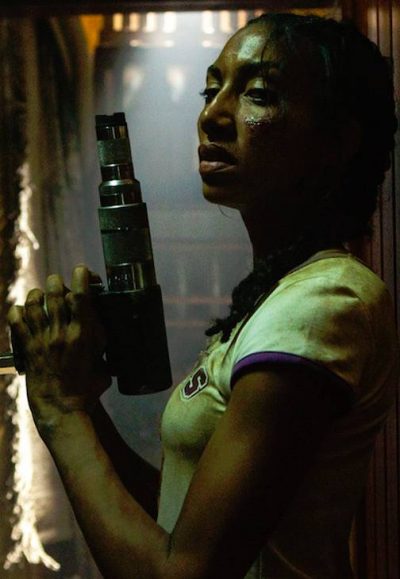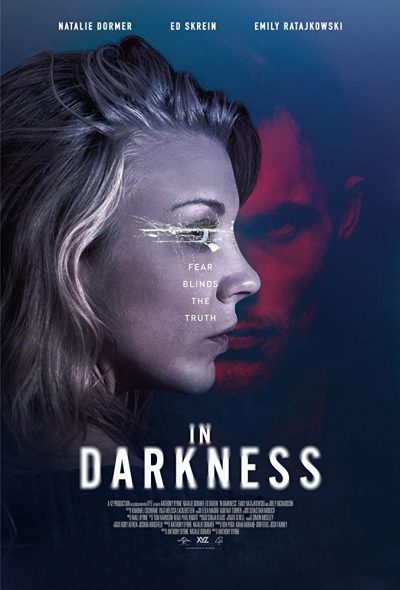★★
“Diamonds are clearly not forever.”
 Erica (Kriis) is an attractive con-artist, who seduces married men in hotels, then drugs and robs them, knowing they’ll never be able to report the crime. She has just brought on an apprentice, Lauren (Patrikios), to learn the dubious trade, watch her back, etc. Their next score turns out to be the jackpot. as they discover the target was carrying a stash of diamonds with a seven-figure value. Absconding with their ill-gotten gains, the pair decide to lay low for a while, and head to Erica’s hideout on the holiday destination of Isabelle Island. They’re disturbed to read news reports that the target turned up dead in the room, and it quickly appears that the owner of the diamonds is closing in on them. But who is the threat? Local policeman, Mike (McCullough), for whom Lauren has a thing? Visiting boat-owner and part-time magician Tom (Berdini), with whom Erica has a fling? Or the creepy bald guy who arrives on the island and appears to be stalking Erica?
Erica (Kriis) is an attractive con-artist, who seduces married men in hotels, then drugs and robs them, knowing they’ll never be able to report the crime. She has just brought on an apprentice, Lauren (Patrikios), to learn the dubious trade, watch her back, etc. Their next score turns out to be the jackpot. as they discover the target was carrying a stash of diamonds with a seven-figure value. Absconding with their ill-gotten gains, the pair decide to lay low for a while, and head to Erica’s hideout on the holiday destination of Isabelle Island. They’re disturbed to read news reports that the target turned up dead in the room, and it quickly appears that the owner of the diamonds is closing in on them. But who is the threat? Local policeman, Mike (McCullough), for whom Lauren has a thing? Visiting boat-owner and part-time magician Tom (Berdini), with whom Erica has a fling? Or the creepy bald guy who arrives on the island and appears to be stalking Erica?
The performer who makes the best impression here is Tybee Island in Georgia, playing the role of Isabelle Island. It seems like a very nice place to take a holiday, picturesque and relaxing. Everyone else? Not so much. In particular, you could have Meryl Streep and Helen Mirren, and they’d still struggle to do anything with a script which resembles French lace, in that it’s a lightly-connected series of holes. For instance, when robbing the target, Erica first comes across an empty briefcase, before locating the diamonds in a tube, hidden in the toilet cistern. Inexplicably. she still takes the briefcase – which, of course, turns out to contain a tracking device. For the film’s entire duration, people both good and bad don’t behave in ways that make logical sense, and Creepy Bald Guy is probably the Worst Stalker Ever, though in his defense, there does turn out to be something of an explanation.
The leads are decent enough. There’s a nice contrast between the utterly cynical and untrusting Erica, who believes she’s on some kind of crusade to punish deceitful men, and the more naive and open Lauren, who gradually becomes more appalled, the more she discovers about her partner. I’d far rather have seen this angle exploited, with the two women turning from Thelma and Louise buddies, into vicious competitors, battling each other for the diamonds. Instead, they literally stand around while the (eventually revealed) good guy and villain tussle it out, mano a mano, on the edge of a convenient cliff. No prizes for guessing how that ends. The other thing is, for a film basically predicated on sexual attraction… it’s tame stuff. Given Kriis bears some resemblance to Penelope Cruz – though she’s Indian rather than Hispanic – this was disappointing. If ever you want proof that technical competence alone is not sufficient to justify a movie’s existence, this should be Exhibit A.
Dir: The Olson Brothers
Star: Elisha Kriis, Ellie Patrikios, William Mark McCullough, Riccardo Berdini






 Lurking behind one of the most cringeworthy titles I’ve ever seen, and a trailer that’s not much better, is a very pleasant surprise. Well, at least if you’re a fan of the “splatstick” genre, mixing over-the-top gore and comedy: Peter Jackson’s Brain Dead is the pinnacle of that genre. I certainly am, and consequently found this a real hoot. Girls volleyball team, the Falcons, are on their way home after their latest victory, when they end up diverted into a small town, populated entirely by inbred rednecks (or the Gallic version thereof). After an encounter in the hotel, they find themselves getting a night-time visit, and are soon being hunted down by the village’s residents. However, the biggest psycho may not be among the locals…
Lurking behind one of the most cringeworthy titles I’ve ever seen, and a trailer that’s not much better, is a very pleasant surprise. Well, at least if you’re a fan of the “splatstick” genre, mixing over-the-top gore and comedy: Peter Jackson’s Brain Dead is the pinnacle of that genre. I certainly am, and consequently found this a real hoot. Girls volleyball team, the Falcons, are on their way home after their latest victory, when they end up diverted into a small town, populated entirely by inbred rednecks (or the Gallic version thereof). After an encounter in the hotel, they find themselves getting a night-time visit, and are soon being hunted down by the village’s residents. However, the biggest psycho may not be among the locals… Is it possible for a homage to be too accurate? This could be the problem here. It’s clear that Bickert has a deep affection for the “women in prison” genre – yet, again, possibly too much so. For this is less a parody or a pastiche than a loving re-creation, and doesn’t understand that a lot of these movies… well, to be honest, they suck. Badly acted, poorly plotted, thinly-disguised excuses for porn. And that’s the
Is it possible for a homage to be too accurate? This could be the problem here. It’s clear that Bickert has a deep affection for the “women in prison” genre – yet, again, possibly too much so. For this is less a parody or a pastiche than a loving re-creation, and doesn’t understand that a lot of these movies… well, to be honest, they suck. Badly acted, poorly plotted, thinly-disguised excuses for porn. And that’s the  As the lazy joke goes, I preferred this film the first time I saw it, when it was called… Well, actually, it was called
As the lazy joke goes, I preferred this film the first time I saw it, when it was called… Well, actually, it was called 
 I literally had to check at the end of this, to see if M. Night Shyamalan had been involved. Because rarely since the likes of Signs – or, worse still, The Village – has a final twist so completely derailed a movie. As soon as it happened here, I was immediately listing off the scenes previously which now made absolutely no sense at all. While it’s hard to provide more information without massive spoilerage, it turned a film which was doing not badly, into one which is a poster-child for poorly-conceived ideas.
I literally had to check at the end of this, to see if M. Night Shyamalan had been involved. Because rarely since the likes of Signs – or, worse still, The Village – has a final twist so completely derailed a movie. As soon as it happened here, I was immediately listing off the scenes previously which now made absolutely no sense at all. While it’s hard to provide more information without massive spoilerage, it turned a film which was doing not badly, into one which is a poster-child for poorly-conceived ideas. Joan Butler (Bernadette) is an enforcer for mob boss Frank (Foster), with a zero-tolerance policy for those who disrespect her – whether they are on her side or not. When this eventually causes some of her gang to turn on Joan, she’s brutally beaten to a pulp, and apparently killed. However, she rises from the dead, now a figure who lives in the darkness, and one who has acquired the power to manipulate shadows. She sets about her mission of revenge against Frank and those who killed her. This is much to the distress of her on/off boyfriend Anthony (Celigo), a social worker. But her feelings for him and desire to protect the unfortunates with whom he works, puts them all at risk, when Frank realizes they represent her weak spot.
Joan Butler (Bernadette) is an enforcer for mob boss Frank (Foster), with a zero-tolerance policy for those who disrespect her – whether they are on her side or not. When this eventually causes some of her gang to turn on Joan, she’s brutally beaten to a pulp, and apparently killed. However, she rises from the dead, now a figure who lives in the darkness, and one who has acquired the power to manipulate shadows. She sets about her mission of revenge against Frank and those who killed her. This is much to the distress of her on/off boyfriend Anthony (Celigo), a social worker. But her feelings for him and desire to protect the unfortunates with whom he works, puts them all at risk, when Frank realizes they represent her weak spot. This wasn’t quite what we expected. In fact, replace “quite” with “at all”. It starts off as looking like some kind of revenge porn, with pathologist Margaret Powers (Tyson) kidnapping Finnbar (Ward), the man she’s certain murdered her son. Finnbar was apparently able to get away with it, because he was the son of a notorious local criminal, Tommy O’Neil (Hayman). She wants Finnbar to confess to his crime, and recruits her son’s ex-girlfriend, Zoe (Jarvis) to help in getting her vengeance. Initially, the capture goes well, with the two women then holing up in an abandoned warehouse by the docks, to begin the interrogation. However, this is where the film starts to diverge from the expected, as it turns out Zoe’s intentions are not in line with Margaret’s, as they initially appeared.
This wasn’t quite what we expected. In fact, replace “quite” with “at all”. It starts off as looking like some kind of revenge porn, with pathologist Margaret Powers (Tyson) kidnapping Finnbar (Ward), the man she’s certain murdered her son. Finnbar was apparently able to get away with it, because he was the son of a notorious local criminal, Tommy O’Neil (Hayman). She wants Finnbar to confess to his crime, and recruits her son’s ex-girlfriend, Zoe (Jarvis) to help in getting her vengeance. Initially, the capture goes well, with the two women then holing up in an abandoned warehouse by the docks, to begin the interrogation. However, this is where the film starts to diverge from the expected, as it turns out Zoe’s intentions are not in line with Margaret’s, as they initially appeared.
 ★★½
★★½